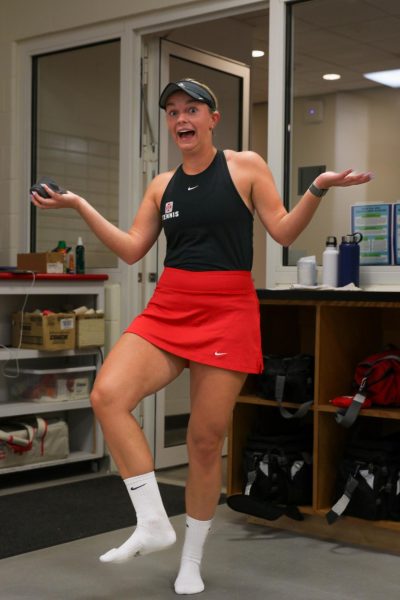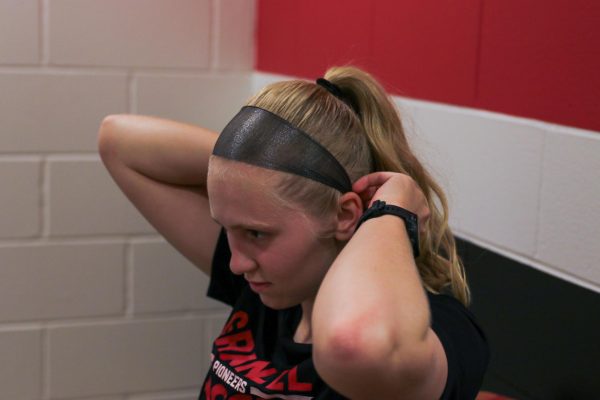Success in team sports requires camaraderie and focus, which, depending on the sport and the team, can take a variety of forms. Individual superstitions, gameday rituals and team traditions are fairly universal experiences for all athletes, and this is no exception at Grinnell.
Many superstitions are sport-specific and often could be generalized to athletes outside of Grinnell. Erin Jarvis `25, a member of the women’s tennis team said, “When we’re playing a match, we try not to walk on any of the white lines on the tennis court … I feel like that’s a pretty common tennis superstition, actually, across the sport. John McEnroe, a former professional, did that and talked about it, and then people just started doing it.”

Sofia DiCarlo `25 said, “In softball, there’s a superstition where, if you touch the foul line, then it’s bad luck,” citing a similar superstition as Jarvis.
Additionally, many Grinnell volleyball players subscribe to their sport’s universal superstitions. Hayley Taka `26 said, “Right before people serve, they have their little routine that they do, like dribble the ball a couple of times or spin it, and they feel like they have to do that before each serve.”
These superstitious habits allow athletes to reduce nerves and increase focus before and during a game. Owen Wilson `25, a member of the men’s soccer team, said that finding that routine helps before a game. “Everyone’s nervous, and so if you have a routine and you kind of visualize getting ready for some sort of match or some sort of practice, it just kind of calms people down and the team down.”
Wilson said, “[Before a game] we’ll walk out of the locker room, and then we’ll get up to where the side entrance of the Bear [Charles Benson Bear `39 Recreation and Athletic Center] is,” describing the men’s soccer team pregame ritual. “We’ll be pretty much quiet until we get to the field, and then the music starts, and we’re pretty energetic.” Wilson said that he has not considered this pregame habit superstitious, as much as it is “getting ready for the game and locking in.”

Different sports are still developing new superstitions, traditions and routines based on past successes, as well as a desire to increase camaraderie to ensure continued and improved success. DiCarlo said, “We [Softball] won Conference for the first time in history two seasons ago, so we’re still establishing traditions. There’s a tradition we started where we get in a huddle, we rock back and forth and we literally scream at the top of our lungs … as long as we continue to set the foundation for how to keep the team positive and close, then that’s all that matters.”
Ty Jones `26, a member of the football team, said that the football program has seen many changes in their routine and traditions, both big and small, in the past two years. One of these new routines entails eating an Uncrustable and drinking a protein shake prior to every game to ensure that players are receiving enough protein and carbs. Outside of pre-game snacks, Jones said, “I think for us [the football team], having that sense of pride is what really changed us from a team of, ‘Okay, we have good athletes’ to a team of ‘Okay, we win games.’” He said, “I think a lot of what we’re trying to do right now is get that sense of pride and passion back, and kind of instill it in the game that we play now, versus just getting athletes lined up and seeing what happens.”
One way that pride, for both their school and their sport, has been instilled in these athletes is through a superstition in which they do not, under any circumstances, step on the College logo before a game. “You avoid it [stepping on the logo] at all costs,” Jones said. “Someone’s done it before and then gotten yelled at [by the team] for doing it.”
DiCarlo provided examples of how traditions can lift the athletes’ spirits and provide a sense of community. She said, “One of my outfielders, we used to do a whip, they’re really stupid, really they’re just to keep us all laughing because it’s cringe, but it’s funny.”
These simple traditions, routines and superstitions among athletes serve to build camaraderie, reduce nerves and create a team environment athletes can take pride in. “When you’re feeling down, you’re probably not as inclined to do the silly things, but that’s why they’re a thing in the first place, to keep it fun,” said DiCarlo.























































Paige Pluska • Oct 14, 2024 at 8:55 am
What a fun article to write! Great job, Olivia!